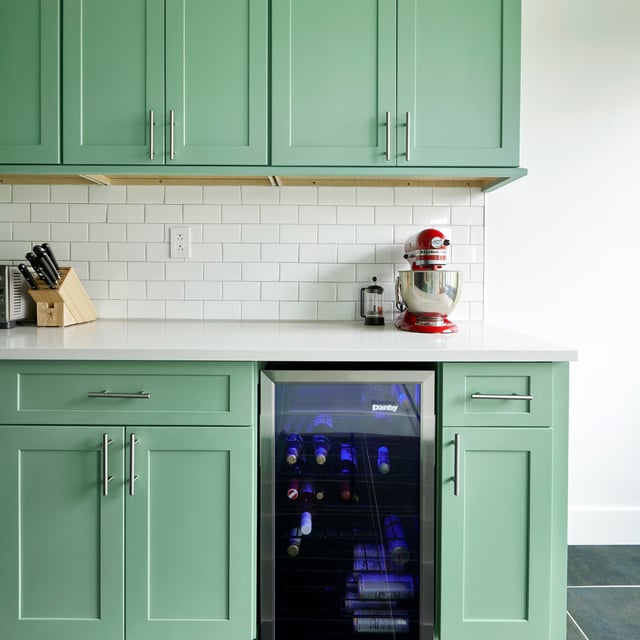.png?width=640&name=u5821215421_ndustrial_loft_kitchen_with_exposed_steel_beams_m_2ee82435-dc1f-4c66-b21b-878cad8b5359_3%20(1).png)
Kitchen
Mixing Metals in the Kitchen: a Guide to Getting it Right
02.02.2026


In This Article
Have you ever wondered how to make the most out of a small kitchen space? Small kitchen remodel ideas can transform your cooking area into a stylish and practical hub of your home. A kitchen is more than just a place to cook; it's where memories are made. We know remodeling can feel overwhelming, especially when space is limited. However, with our innovative tips and tricks, you can unlock the full potential of your cozy kitchen!
Planning and design are the cornerstones of any successful small kitchen remodel. With limited space to work with, it's vital to organize every inch wisely to achieve both style and functionality.
Design a Home That’s Uniquely Yours
Block can help you achieve your renovation goals and bring your dream remodel to life with price assurance and expert support.
Get Started
In a small kitchen, understanding the space constraints is crucial for a successful kitchen remodel. Limited space means that every inch counts, and it's essential to identify areas where space can easily be wasted. By analyzing the layout and workflow of your current kitchen, you can pinpoint opportunities to enhance usability and style. This insight helps in planning a design that maximizes functionality without compromising on aesthetics.
When starting a small kitchen remodel, it's vital to set a realistic budget. Decide on an amount you're comfortable spending, and plan for unexpected costs by setting aside a little extra. A clear budget helps guide decisions, ensuring that investments in materials or appliances contribute to the kitchen's beauty and utility.
A cohesive design theme can make a small kitchen feel more unified and spacious. By choosing a consistent color palette and style, all aspects of the kitchen will work together seamlessly. This harmony not only enhances visual appeal but also ensures that the kitchen remains functional and welcoming.
In a small kitchen, prioritize features that enhance day-to-day living. Consider what's most important, like ample storage for your needs or extra counter space for meal prep. Focusing on essential features ensures that your kitchen is both practical and pleasant to work in.

Finding clever storage solutions is key to maximizing space in a small kitchen. By incorporating smart organizing techniques, you can create a tidy and efficient environment without sacrificing style.
Utilizing vertical space with shelving is a smart strategy for enhancing storage in a small kitchen. Instead of relying solely on limited counter and cabinet space, think upwards and add open or floating shelves. By doing so, you can store and display items such as dishes, cookware, or even small plants, creating both a functional and visually appealing space. Vertical shelving also allows for easy access to frequently used items, making your kitchen more efficient. Additionally, it offers a chance to personalize your kitchen by showcasing your favorite dishes or colorful jars, adding a unique touch to the overall design.
Pull-out cabinets and drawer organizers can transform your kitchen's functionality. These features allow you to access items at the back of cabinets without digging through everything in front. By making every inch of cabinet space usable, pull-outs and organizers minimize clutter and keep cooking essentials within easy reach. This smart organization makes cooking and cleaning more efficient, saving time and effort.
Magnetic knife strips and hanging pot racks are excellent for saving counter and drawer space. Instead of cramming knives into a drawer, a magnetic strip keeps them safely organized on the wall, freeing up drawer space for other utensils. Meanwhile, hanging pot racks utilize overhead space to store bulky pots and pans, keeping them easily accessible. These solutions not only improve storage but also add a touch of professional style to your kitchen.
Corner spaces in kitchens are often underutilized, but lazy Susans and specialized corner cabinets can change that. A lazy Susan provides rotating access to stored items, making it ideal for corner cabinets where things can get lost. These solutions maximize hidden areas, ensuring no space goes to waste. By making corner spaces more accessible, you enhance both the storage capacity and convenience of your kitchen.
Renovate with confidence every step of the way
Step 1: Personalize Your Renovation Plan
Step 2: Receive Quotes from Trusted Contractors
Step 3: Let Us Handle the Project Details

Choosing space-saving appliances is crucial for making the most of a small kitchen. By selecting compact and multifunctional devices, you can maintain a sleek design while ensuring all your cooking needs are met.
In a small kitchen, compact and multifunctional appliances are your best friends. These appliances perform the tasks of several devices, saving both space and money. For instance, a microwave that also functions as a convection oven eliminates the need for two separate items. By reducing the number of appliances, you create a more organized and spacious kitchen environment, allowing for a better workflow.
Under-cabinet appliances are a savvy choice for small kitchens, as they save valuable counter space. Dishwashers, microwaves, and even coffee makers can be tucked neatly beneath cabinets, making them easy to access while keeping the main area clear. This integration helps maintain a clean, uncluttered look in your kitchen and maximizes every bit of available space for other essential tasks.
Choosing appliances that blend with cabinetry creates a seamless and uncluttered appearance. For example, hidden refrigerator cabinets can virtually disappear into the design and look seamless. This not only gives your kitchen a cohesive feel but also makes the space appear larger and more open. By blending appliances with cabinetry, you ensure that your kitchen remains stylish without sacrificing functionality.

Crafting an innovative kitchen layout can significantly enhance the functionality of a small space. By exploring different configurations, you can create a space that is both efficient and welcoming.
Open-plan kitchen concepts break down walls, creating a more fluid space that connects with adjoining areas like the dining or living room. This approach makes the kitchen feel larger and more inviting, promoting interactions while cooking or entertaining. By opening up the kitchen, you're not just enhancing the space aesthetically; you're also improving the overall function and flow of your home.
Even in small kitchens, adding a kitchen island or a movable cart can offer extra workspace and storage. These features provide a central point for preparing meals or socializing, making the kitchen more dynamic. With a cart, you have the advantage of mobility, easily moving it out of the way when not needed, which is perfect for optimizing limited floor space.
U-shaped and L-shaped layouts are ideal for small kitchens because they create a natural workflow. The U-shaped design wraps around three sides, maximizing counter and storage space, while the L-shaped layout promotes open space by occupying two walls. Both options allow for efficient movement between work areas, making cooking and cleaning more manageable.
Lighting and color schemes play a pivotal role in transforming the look and feel of a small kitchen. By choosing the right combinations, you can create an inviting atmosphere that also enhances the perceived size of the space.
Proper lighting is essential in small kitchens, as it helps highlight the design and functionality of the space. Good lighting eliminates shadows and dark corners, making the kitchen appear larger and more inviting. Consider layering different types of lighting, such as ambient, task, and accent lights, to ensure every part of your kitchen is well-lit and welcoming.
Light colors, such as whites, creams, and pastels, can make a small kitchen feel more open and airy. These shades reflect natural light, enhancing the sense of space and making the kitchen look larger. By incorporating light-colored walls, cabinets, and countertops, you create a bright and cheerful environment that feels spacious and fresh.
While light colors form the base, adding pops of color or bold patterns can bring energy to a small kitchen. Consider colorful backsplashes, vibrant rugs, or patterned tiles to draw the eye and highlight key areas. These elements add personality and style without overwhelming the space, creating an interesting balance between subtlety and boldness.
Compare Proposals with Ease

Stylish finishing touches can elevate a small kitchen from simply functional to truly fabulous. By focusing on the details, you can infuse your kitchen with personality and charm, making it a place where you'll love to spend time.
Selecting stylish yet functional hardware is a simple way to upgrade the look of your small kitchen. Consider sleek handles and knobs in finishes like brushed nickel or matte black to give your cabinets a modern touch. These small details not only enhance the aesthetic but also improve the usability of drawers and cabinets, blending beauty with practicality.
Quartz and granite countertops are excellent choices for their durability and elegance. These materials withstand daily wear and tear while adding a touch of luxury to your kitchen. Their resilience ensures that your kitchen remains not only stylish but also hard-wearing, standing up to the demands of a busy cooking environment.
Backsplashes are a perfect opportunity to make a statement in a small kitchen. Whether you choose colorful tiles, intricate patterns, or reflective materials, a striking backsplash can become a focal point. It adds character and depth to your kitchen design, while also protecting the walls from splashes and spills, marrying form and function effectively.
Deciding between DIY and professional help for a small kitchen remodel is an important step in the renovation process. Understanding the benefits and limitations of each option can guide you toward the best choice for your project.
Embarking on a DIY remodeling project can be rewarding, but it requires careful planning and skill. If you have experience with tools and renovation, a DIY approach can save money and allow for personal creativity. However, it's important to consider the complexity of tasks like plumbing or electrical work, which may be better left to a professional contractor to avoid costly mistakes.
Hiring a contractor can be beneficial, especially for complex or large-scale renovations. Professionals bring expertise and knowledge that ensure the work is done safely and efficiently. If your project involves structural changes or requires licensed work, entrusting a contractor can provide peace of mind and a smooth remodeling experience.
While DIY projects can initially seem cheaper, hidden costs can add up quickly. Mistakes made without professional guidance might result in costly repairs down the line. In contrast, a contractor might have access to wholesale prices and industry discounts, potentially offsetting some of the costs, ensuring quality work that aligns with your budget and vision.
Transforming a small kitchen into a stylish and practical space is within reach with careful planning and creative design choices. By incorporating smart storage solutions, efficient layouts, and cohesive themes, you can turn your kitchen into a functional and inviting hub. Embrace the opportunity to mix creativity with practicality, letting your unique style shine through. With these inspiring ideas at your fingertips, you're well-equipped to embark on your own kitchen transformation journey!

Written by Block Renovation
What is the average cost of a small kitchen remodel?
How long does it typically take to remodel a small kitchen?
What are the common challenges faced during a small kitchen remodel?
How can I make my small kitchen look larger?
Are there specific colors that work best in a small kitchen?

Renovate confidently with Block
Easily compare quotes from top quality contractors, and get peace of mind with warranty & price protections.
Thousands of homeowners have renovated with Block

4.5 Stars (100+)

4.7 Stars (100+)

4.5 Stars (75+)
.png?width=640&name=u5821215421_ndustrial_loft_kitchen_with_exposed_steel_beams_m_2ee82435-dc1f-4c66-b21b-878cad8b5359_3%20(1).png)
Kitchen
Mixing Metals in the Kitchen: a Guide to Getting it Right
02.02.2026
.jpg?width=640&name=c4dbb180-5d7c-45ed-a7e4-5851358dee67%20(3).jpg)
Kitchen
Remodeling Kitchens Without Windows - Design Ideas
01.17.2026

Kitchen
Kitchen remodel Denver: costs, permits, and tips
01.13.2026

Kitchen
Ideas for Transitional Kitchen Design
12.23.2025

Kitchen
Modern Rustic Kitchen Designs & Remodels
12.18.2025
Renovate confidently